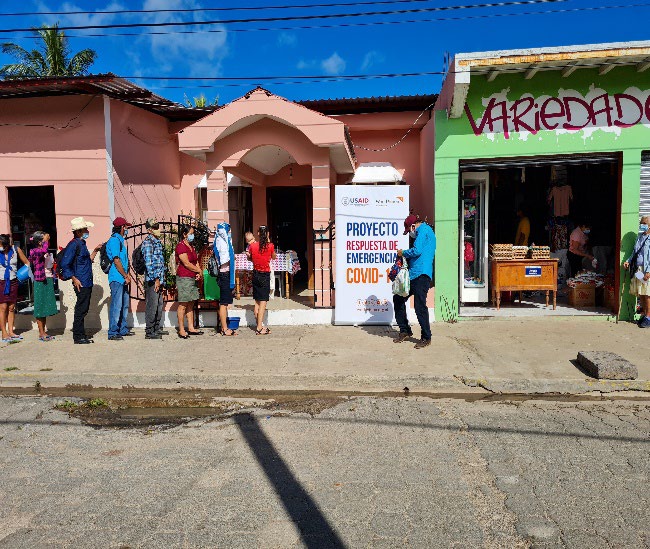By Monica Jerbi, ME&A Communications Manager
In complex or conflict-affected environments where access may be restricted, or security concerns are prevalent, third-party monitoring (TPM) typically delivers greater access and mobility than USAID personnel or traditional monitoring, evaluation, and learning teams. This enhanced access enables local third-party monitors to gather vital data and insights for informed decision-making and effective program implementation.
“ME&A, a small, woman-owned business, is an effective TPM partner for USAID even in challenging environments. We bring diverse perspectives and innovative solutions tailored to local needs and can adapt faster to complex situations than many larger organizations,” said ME&A President and CEO Teresita Perez. “We also bring the right skill set to partner with USAID to pioneer cutting-edge data-gathering technology to ensure marginalized voices are heard. Our approach to TPM is consistent with ME&A’s overall suite of services that support locally-led development. These services include our unique approach to local capacity strengthening at systems and individual institutional levels.”
ME&A draws on multiple remote sensing and geographic information system (GIS) data sources to conduct remote TPM and develop dashboards to communicate evidence in a user-friendly format where users interact with the data to obtain detailed maps, charts, texts, and media. ME&A also employs a multi-method approach for TPM data collection, including data analytics, georeferenced site visit observations, key informant interviews, focus group discussions, verification checklists, and desk reviews of project documents. This comprehensive approach enables monitoring project inputs and outputs, facilitating comparisons with internal monitoring efforts for each activity, and enhancing USAID activities’ evidence-based decision-making.
Recent examples of ME&A’s TPM work include:
- After the Nicaraguan regime suppressed peaceful protests, limiting USAID/Nicaragua’s monitoring ability, ME&A began providing TPM services to collect performance data on four democracy and governance activities in Nicaragua via the regional Monitoring, Evaluation, and Learning (MELI) initiative through USAID/El Salvador. This helped USAID adapt its implementation to the challenging context, with MELI acting as the Mission’s “eyes and ears” on the ground. MELI’s TPM services also included helping USAID’s Bureau for Humanitarian Assistance gather data on aid given to local Nicaraguan communities. Using Survey123, MELI broke down the data by gender and age to see which groups benefited the most and where they were in the country. In response to COVID-19, MELI used GIS to combine in-person and remote data collection, conducting 60 interviews and tracking activities in real time. MELI verified partner reports, prepared detailed site visit reports, captured beneficiary feedback, tracked work plan progress, and provided updated information on the political, social, and economic context.
- Under the USAID/Rwanda Collaboration, Learning, and Adapting Activity (CLAA), ME&A partners with the Centre for Impact, Innovation, and Capacity Building for Health Information Systems and Nutrition to monitor the Transforming Rwanda Medical Supplies (TRMS) Activity. The ME&A-led team provides regular reports on the flow of USAID-supported health supplies from the central warehouse to end-users, along with recommendations to improve the supply chain’s efficiency and effectiveness. This work ensures an accountable and transparent delivery system, validates TRMS data and improves the reliability of reports. CLAA also contributes a yearly policy brief with recommendations for corrective actions.
- In Bangladesh, the ME&A-led Bangladesh Monitoring, Evaluation, and Learning (BMEL) Activity conducted 110 site visits across 11 districts, covering events such as training, workshops, meetings, and monitoring construction projects, health clinics, and local service providers. BMEL submitted 28 reports with 273 recommendations for improving USAID-funded activities. In areas sheltering Rohingya refugees, ME&A-led teams partnered with local organizations whose field monitors speak the language and are trusted by the community, avoiding repeated visits by the same monitors to ensure transparency. The ME&A-led teams used GPS-stamped photos, text messages, and audio recordings to verify locations and discussions. This approach helped eliminate errors and minimize bias, enhancing the effectiveness of BMEL TPM efforts.

World Vision Food Distribution in San Nicholas, Nicaragua.
These examples show how U.S. small women-owned businesses like ME&A help introduce cutting-edge technology to TPM activities while supporting USAID’s goal of promoting global prosperity and stability through local partners. ME&A is an especially appropriate USAID partner for using TPM for locally led development because of the firm’s Performance Improvement of Local Systems (PILS) approach. The PILS approach focuses on bringing local actors together to identify and fix problems in local systems to improve performance and build capacity, including with technology.
PILS is similar to USAID’s Human and Institutional Capacity Development (HICD) approach, which focuses more on individual institutions. ME&A has over a decade of HICD experience, including our HICD work in Georgia with many government and non-governmental institutions and in Armenia with public and private institutions related to sustainable water resources management. Applying PILS and HICD to TPM team building and system design – especially regarding security assessments for field monitors and gauging technological perceptions in target areas – empowers local actors to develop local TPM capacity within local systems while minimizing risks to USAID.
“At ME&A, we believe the integration of TPM, PILS and HICD embodies USAID’s commitment to locally led development, combining advanced data-gathering technology with systems-focused implementation,” said Ms. Perez. “By merging PILS’s systems-focused capacity-building strategies with TPM’s localized monitoring and cutting-edge technologies, ME&A delivers to USAID reliable and actionable data to help drive sustainable change. This synergy enhances collaboration, accountability, and innovation while supporting USAID’s localization and small business contracting goals.”





